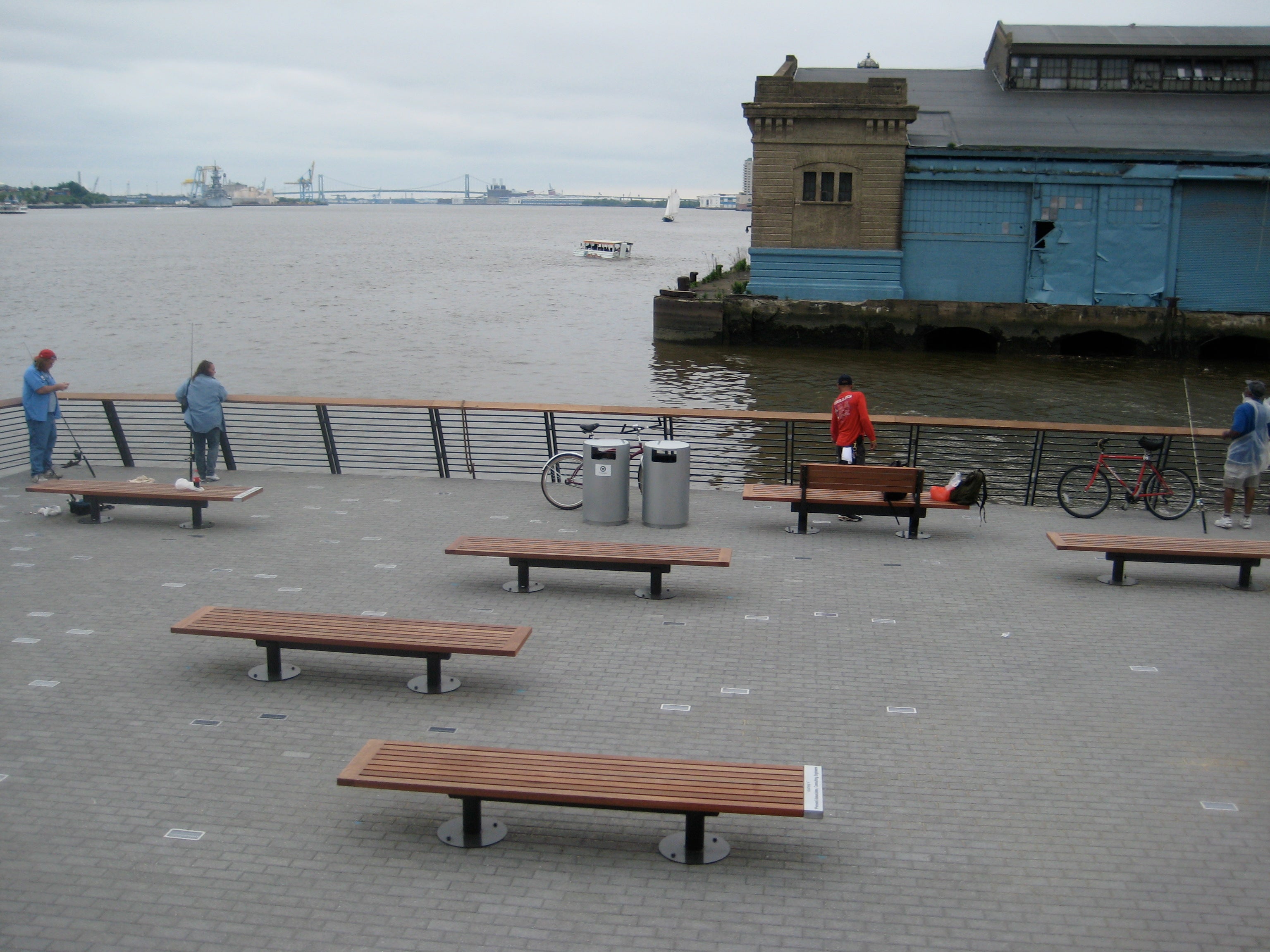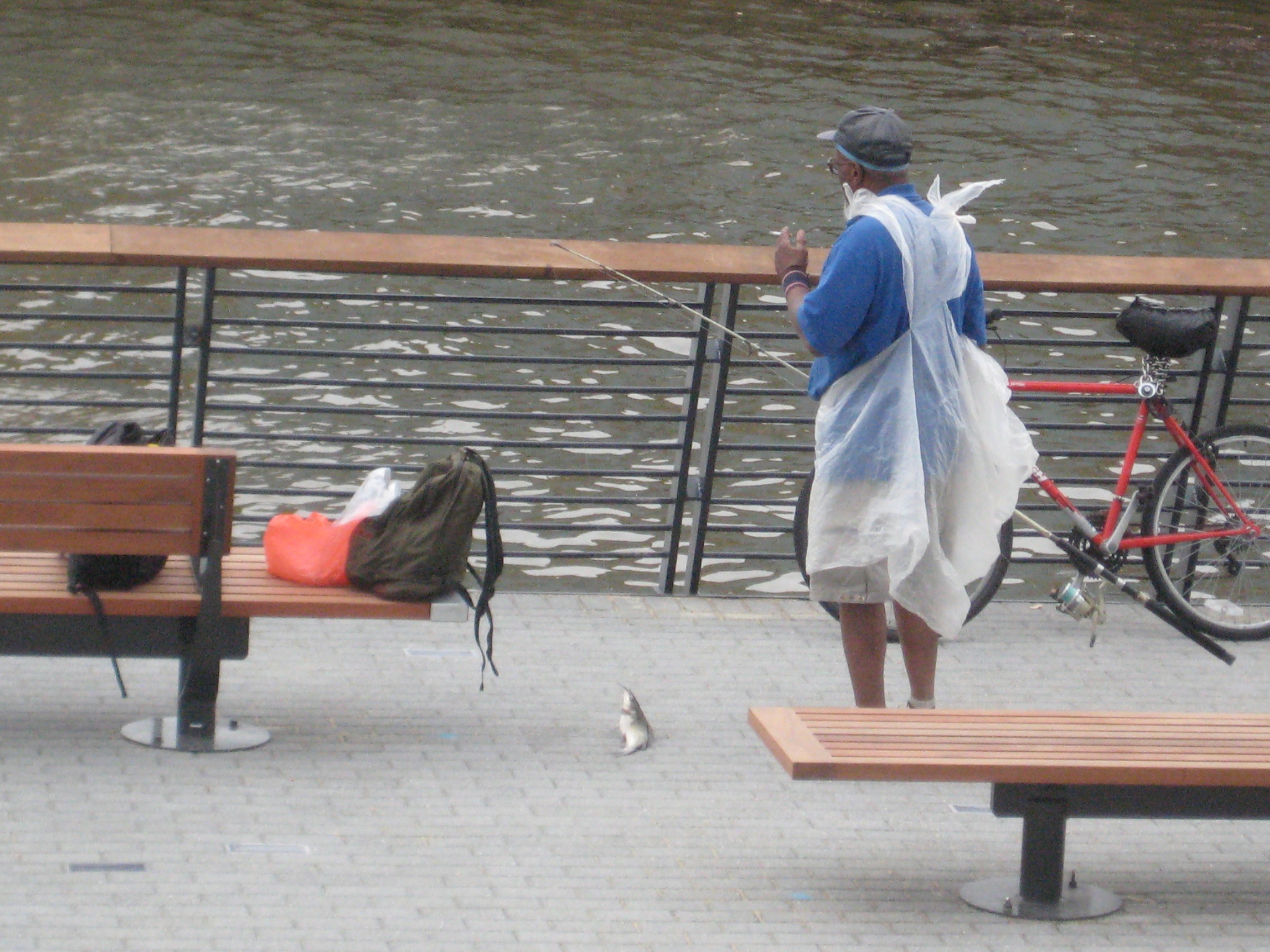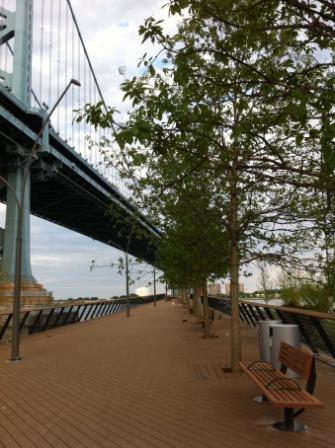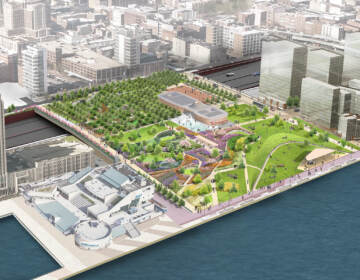Updated: Fishing no longer allowed at Race Street Pier
A new sign has been posted on Race Street Pier: No Fishing.
The Delaware River Waterfront Corporation based the decision to ban fisherfolk partly on the behavior of a minority of anglers according to DRWC President Tom Corcoran. “They were gutting fishes on the benches, and leaving behind blood and guts, and that stuff attracts rodents,” he said. Some people were leaving hooks behind. Some would pry up pier bricks so they could prop their poles in that spot – both a tripping hazard and a maintenance headache for DRWC employees.
The largest issues are safety-related, Corcoran said. Some fishers were casting lines off the north side of the pier, where the Duck Boats go in and out of the water. A line could become entangled in a motor, Corcoran said. And everyone who fished had to cast a line with a hook on the end of it.
“While we want to encourage fishing on the water, mixing families with young children and fishing is not a good practice,” Corcoran said. “Kids running around and hooks flying around – it just doesn’t work. There are too many things that can go wrong.”
Corcoran said the decision was reached reluctantly, and the problems were simply not foreseen before the pier opened. When asked if it would change things if fishers organized a regular clean up of the pier, Corcoran said it would not, because safety is the bigger concern.
Fishing is still permitted from Delaware Avenue to the south of Race Street Pier, between it and Pier 9. Soon, Corcoran said, other signs will go up at Race Street Pier, telling people who want to fish that fishing is allowed at Penn Treaty Park in Fishtown, Washington Avenue Green park in Pennsport, and Pulaski Park in Port Richmond, with directions on how to get there.
The DRWC is also committed to creating future public space where people can fish from a structure that juts out into the water, where the water will be deep no matter the tide.
People now fish in a little bay-type area to the south of Pier 53 – the closed off, abandoned park that sticks out past Washington Avenue Green Park. “We plan to be looking at extending Washington Avenue Green out on to Pier 53,” Corcoran said. “If we do that, we want to design a specific portion just for fishermen.”
Corcoran said the Pier 53 project is in the feasibility study stage. Among the things that need to be determined: What types of permits would be needed from the Army Corp of Engineers and other entities, and how likely is the DRWC to get them.
But the current thinking is that a boardwalk would be built over top of the existing, degraded pier. With Race Street Pier, the underlying structure remained sound and could be reused. But with Pier 53, Corcoran said, just eyeballing it shows it has degraded to the point where fixing it would be much more costly than building a new structure. In fact, it’s in part because of the rotting wood supports that the area is such a great fish habitat, he said.
The boardwalk structure would be self-supporting, so that even if the old pier totally collapsed one day, the boardwalk would remain, Corcoran said.
A portion of that new structure could be reserved just for fishing, Corcoran said. That would mean non-fishers wouldn’t go there, and there would be no risk.
If a reason should turn up why fishing on a new structure at Pier 53 isn’t feasible – or if the new structure itself isn’t feasible due to permitting or cost issues – Corcoran said another fishing-only pier will be built instead. “We will develop a fishing pier somewhere,” he said. “Just like boating and canoing, fishing is a sport that we want to encourage on the riverfront.”
Port Richmond resident Nicholas Smuk, 48, had been fishing the pier regularly since it opened. “I was catching catfish, eels, perch, and small striped bass once in a blue moon,” Smuk said. “Catch -and – release.”
He believes banning fishing there is a mistake.
Smuk said he’s never seen anyone cleaning fish at the pier, but he knows that some fishers had left a mess behind. “I’ve picked stuff up after they left,” he said. But he believes the way to combat both poor behavior and any safety concerns is to establish and enforce fishing rules.
When a couple had a bottle of wine at their picnic, a security guard told them no alcohol was allowed, he said. When a woman took her dog onto the grassy lawn, where dogs are not allowed, a security guard told her that was a no-no.
Smuk said a catch-and-release only rule would eliminate fish gut messes.
Smuk has participated in the public sessions on the waterfront’s future. As he fished, he talked to others about what he learned. “They would say how nice the pier was, and I would tell them that the city plans to build other parks, every half-mile along the river,” he said.
He appreciates DRWC’s commitment that the future of the waterfront includes places to fish, but said that could be years away. And he is disappointed that DRWC didn’t think through the fishing thing before the park opened. “If fishing had never been allowed there, we wouldn’t be having this conversation,” he said. “But they gave something, and then they took it away.”
Smuk said he will continue to volunteers with Friends of the Race Street Pier, but he is also trying to convince the DRWC to reverse the Race Street Pier fishing ban.
Reach the reporter at kgates@planphilly.com.
WHYY is your source for fact-based, in-depth journalism and information. As a nonprofit organization, we rely on financial support from readers like you. Please give today.







